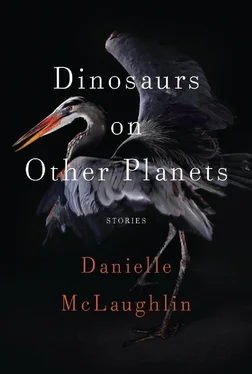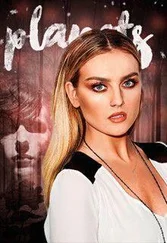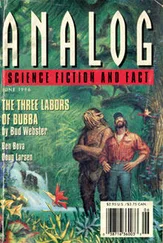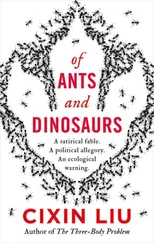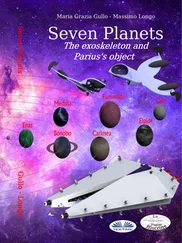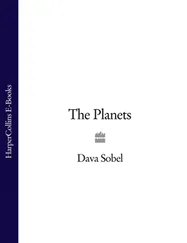“Where is she?” Aidan said again. He caught Sarah by the shoulder and shook her, and she realized that the thing under his arm was not a stick, but a gun.
“She’s in the car,” she said. “The baby’s coming.” She jumped back as a wave rushed in, wetting her shoes and the ends of her jeans.
The boat was close to shore now, Jonathan standing at the helm. Another wave rolled in and a seal came crashing onto the beach. It landed with a thud on its back then flipped over onto its stomach. It lay bleeding on the sand by Sarah’s feet and when she dropped to her knees, she saw the hole in the side of its head where it had been shot. “Oh my God,” she said, letting the flashlight fall from her hand. “Oh my God, oh my God.”
“Give me the car keys.” Aidan was standing over her, his hand outstretched.
“They’re in the ignition,” she said, without looking at him, and he turned and broke into a run, back up the cliff path, the gun still under his arm.
The boat was within a few meters of shore and Jonathan stepped out, pulled it up onto a bank of pebbles. He, too, wore an oilskin, the hood tight around his face, and waders that reached to the top of his thighs. “They’ve got brazen,” he said, walking toward her across the sand. “They’ve been eating through the nets, destroying the catch.” He held out a hand to help her up, but she didn’t take it.
A wave thundered in and, farther up the cove, another seal was tossed onto the beach. She left the first seal and ran to the second. This one was smaller — a pup, she thought — its skin a lighter color. Blood dribbled from its mouth and from a wound in its neck, and all along the edges of the rocks the tide foam was stained a deep pink.
Jonathan had followed, slowly, across the sand, and now he stood looking down at her, his hands in his pockets. “Is Pauline okay?” he said. “Is it the baby?”
Sarah was crouched beside the seal. It was still alive, a steady trickle of blood coming from its mouth, its chest rising and falling.
“We’ll take the boat back to Moville,” Jonathan said. “The van’s parked at the pier. You’ll need to change before we go to the hospital.”
She rubbed at her wet jeans, tried to brush away the pebbles and bits of broken shell that clung to them, and saw that they were stained with the seal’s blood. And still the waves charged in, an incessant advance and retreat, and, a few feet away, the body of another seal somersaulted onto the rocks. “We can’t leave them like this,” she said. She reached out a hand and touched the seal pup’s head. It flinched but did not pull away, its eyes, black as onyx, beginning to lose focus.
“They’re almost dead,” he said, and she could hear the impatience in his voice. “The tide will carry them back out.” He was already walking away from her, toward the boat. “Come on,” he said, as he dragged it to the water. “Climb in.”
She got to her feet and looked around the beach. The wind had eased, the night sky was clear, and the clean, white bones of a dead seabird were scattered across the sand like pieces of carved ivory. At the base of the cliffs, a length of timber, slime green and rotting, was jammed between two rocks. She dislodged it and dragged it back across the sand to where the seal lay dying.
Jonathan shouted to her from the water. “What are you doing?” he said. To the south, beyond the village, lights appeared on the cliff top, the headlights of a car pulled in on the coast road. “Come on,” he said. “We need to get out of here,” and he jumped into the boat.
She stood over the seal and raised the piece of timber. She heard the splutter of an engine and saw Jonathan standing in the boat, waiting for her. He did not speak or call and he appeared only in silhouette, his face featureless under the dark oilskin. She looked down at the seal and saw its half-closed eyelid flicker. All around her, the shore glittered like a sequined cloth, tiny shells and pebbles luminous in the moonlight, even as blood darkened the sand. She stood there, the timber held high above her head, the seal bleeding out at her feet. And all the time the waves rushed in, remorseless, and, beautiful across the water, steadfast and unblinking, shone the lights of Magilligan.
The Smell of Dead Flowers
The house on Drumcondra Road was a double-fronted red-brick with bay windows and a wooden door set back into an arched porch. I put down my suitcase and rang the bell. A huddle of sickly plants, brittle stemmed and arid, stood in pots on the front step. There was an elaborate twisting of keys in locks, a sliding across of bolts, and all the time Lou Anne shouting at me to “hold on,” as if, after making the journey from Tuamgraney, I might turn around and go back again. “How was the bus?” she said when finally I stepped inside, and then, without waiting for my reply, “How was the taxi?”
Lou Anne was my mother’s cousin, and her house was on the bus route to the university. She was the same age as my mother, somewhere in her early forties, but her clothes were unlike anything my mother might wear: a knee-length turquoise dress, gold braiding at the collar and sleeves, an amber brooch squatting like a beetle on her shoulder. Her hair was henna red, tied in a ponytail with the faintest tidemark of gray around the temples. She had her back to me and was busy with the door, bolts squealing like pigs as she coaxed them into place. On the hall stand was a telephone, something we hadn’t yet got at home. There was a rug that didn’t quite stretch the full width of the hall, so that along the edges I caught a glimpse of black-and-white checkered tiles. Several leaves lay scattered about, carried in perhaps by the wind because above the door a small square of glass was missing from the fanlight.
Finished at last with the bolts, Lou Anne turned to me. “Look at you,” she said. “All grown up,” and she shook her head, as if my reaching adulthood were something she hadn’t countenanced. She reached for my hand but didn’t shake it. Instead she straightened out my fingers, and worked her way from one to the next, pinching the middle joints. “You have good hands,” she said. Her own hands were bumpy and stubby fingered, not at all how I imagined the hands of a pianist, but then it was only ever my mother who called her that; my father called her “the hippie” or “the head case,” sometimes “the communist,” depending on his mood, and on how he was getting along with my mother. Because in the way that Lou Anne was my mother’s cousin and not my father’s, so, too, was she my mother’s friend.
I unzipped my shoulder bag and brought out the box of perfumed soaps my mother had gift-wrapped, purple ovals inlaid with flower petals. “There was no need for anything like that,” Lou Anne said, but already she was tearing open the wrapping paper. I looked at her — her legs bare under the gold-braided dress — and thought my mother had got it wrong, Lou Anne was not a gift soap sort of woman, but she pried an oval from its plastic hollow and pinched it the way she had pinched my fingers. She seemed genuinely pleased. “Lavender,” she said, bringing it to her nose and sniffing. “Your mother and I went through a phase when we would wash ourselves with nothing else.” She pressed the oval back into its plastic nest and dislodged a little half-moon of soap from under her nail. She smiled at me then, and I saw that she was quite beautiful and younger looking, when she smiled, than my mother.
Somewhere upstairs a door opened, and a young woman appeared on the landing. She was tall and plump, her roundness apparent even from this distance beneath blue pajamas. The last time I’d met Cassie, we’d both been children, and I was startled to see her now, in body at least, a grown woman. “You remember my daughter,” Lou Anne said, and I had a sudden, vivid recollection of a day at our farm when I was ten and Cassie twelve, when she’d squatted to pee outside the milking parlor, sending a yellow stream winding through the dust of our yard. The exact nature of Cassie’s disability was never discussed in our house. She rarely spoke and was sickly, as well as being what my father called “backward,” though my mother would tut-tut whenever he used that word. Cassie still wore her hair in two dark brown plaits, at odds now with her new adult shape. Lou Anne called up the stairs. “Go back to your room,” she said. “I’ll be up in a while,” and Cassie turned, retreated across the landing. “Come on,” Lou Anne said then, putting the box of soaps down on the hall table, “I’ll show you your bedroom.”
Читать дальше
